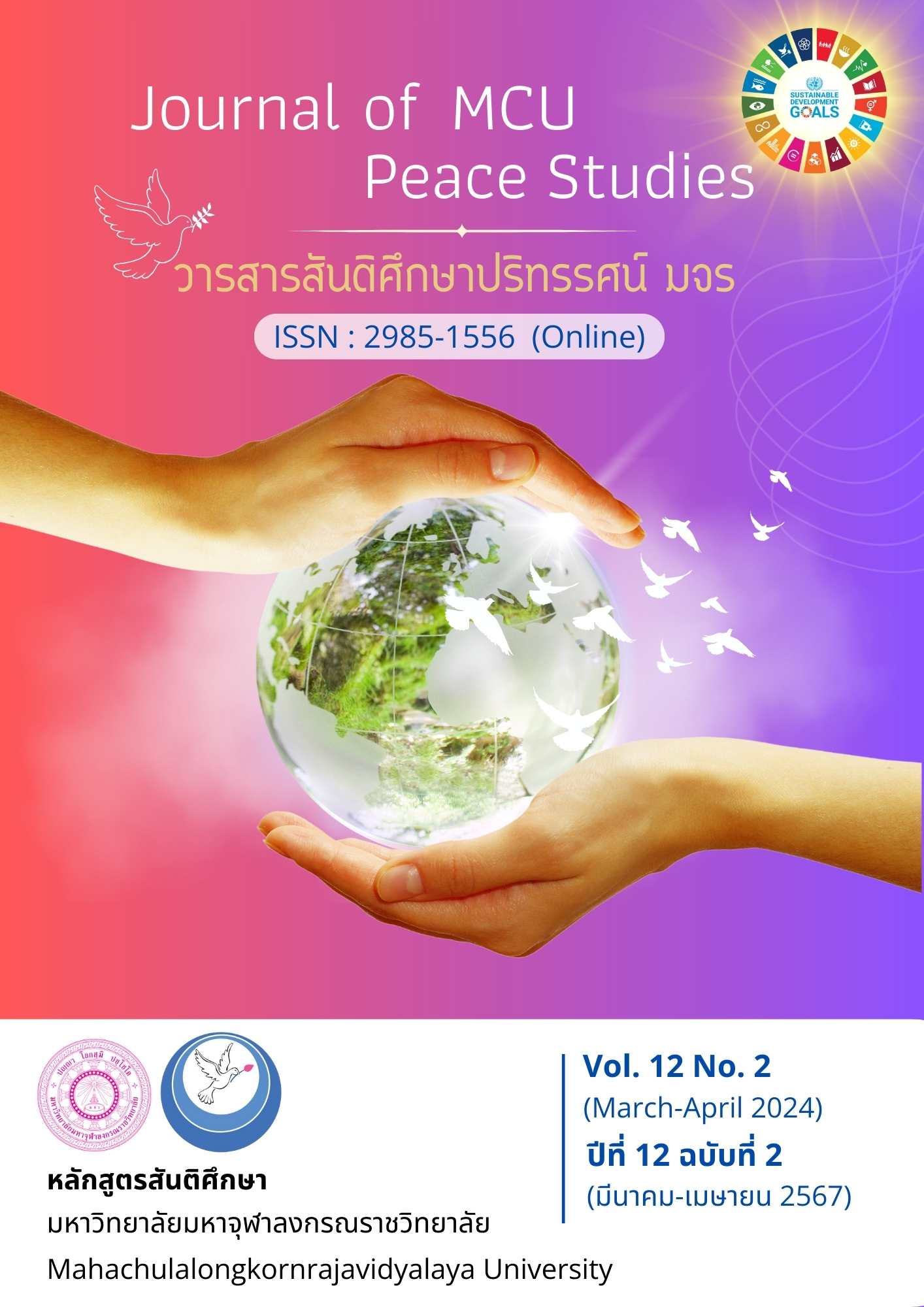การพัฒนาทักษะกระบวนการทางวิทยาศาสตร์และผลสัมฤทธิ์ทางการเรียนของนักเรียนชั้นมัธยมศึกษาปีที่ 3 หน่วยไฟฟ้า โดยการจัดการเรียนรู้เทคนิค STAD ร่วมกับ TPACK
Main Article Content
บทคัดย่อ
การวิจัยครั้งนี้มีวัตถุประสงค์เพื่อ 1) พัฒนาแผนการจัดการเรียนรู้ หน่วยไฟฟ้า ของนักเรียนชั้นมัธยมศึกษาปีที่ 3 โดยการเรียนรู้เทคนิค STAD ร่วมกับ TPACK ให้มีประสิทธิภาพตามเกณฑ์ 80/80 2) เปรียบเทียบทักษะกระบวนการทางวิทยาศาสตร์และผลสัมฤทธิ์ทางการเรียนของนักเรียนก่อนเรียนและหลังเรียน 3) ศึกษาความพึงพอใจของนักเรียน โดยใช้การจัดการเรียนรู้เทคนิค STAD ร่วมกับ TPACK เป็นการวิจัยเชิงทดลอง กลุ่มตัวอย่างที่ใช้ในการวิจัย คือ นักเรียนชั้นมัธยมศึกษาปีที่ 3 โรงเรียนบ้านโพนแพง เจียรวนนท์อุทิศ 5 ภาคเรียนที่ 2 ปีการศึกษา 2565 จำนวน 30 คน ได้มาโดยการสุ่มแบบกลุ่ม เครื่องมือที่ใช้ในการวิจัยประกอบด้วยแผนการจัดการเรียนรู้เทคนิค STAD ร่วมกับ TPACK แบบทดสอบวัดทักษะกระบวนการทางวิทยาศาสตร์ แบบทดสอบวัดผลสัมฤทธิ์ทางการเรียนและแบบสอบถามความพึงพอใจ สถิติที่ใช้ในการวิเคราะห์ข้อมูล ได้แก่ ร้อยละ ค่าเฉลี่ย ส่วนเบี่ยงเบนมาตรฐาน และสถิติทดสอบค่าที (t-test for dependent samples)
ผลการวิจัยพบว่า 1) แผนการจัดการเรียนรู้เทคนิค STAD ร่วมกับ TPACK ของนักเรียนชั้นมัธยมศึกษาปีที่ 3 หน่วยไฟฟ้า มีประสิทธิภาพเท่ากับ 81.20/82.11 ซึ่งสูงกว่าเกณฑ์ที่กำหนดไว้ 2) ทักษะกระบวนการทางวิทยาศาสตร์การจัดการเรียนรู้เทคนิค STAD ร่วมกับ TPACK มีคะแนนก่อนเรียนร้อยละ 16.22 และหลังเรียนมีคะแนนร้อยละ 81.56 เมื่อเปรียบเทียบทักษะกระบวนการทางวิทยาศาสตร์หลังเรียนสูงกว่าก่อนเรียนอย่างมีนัยสำคัญทางสถิติที่ระดับ .01 และผลสัมฤทธิ์ทางการเรียนหลังเรียนสูงกว่าก่อนเรียนอย่างมีนัยสำคัญทางสถิติที่ระดับ .01 3) ความพึงพอใจของนักเรียนที่มีต่อการจัดการเรียนรู้เทคนิค STAD ร่วมกับ TPACK อยู่ในระดับมากที่สุด มีค่าเฉลี่ยเท่ากับ 4.70
Article Details

อนุญาตภายใต้เงื่อนไข Creative Commons Attribution-NonCommercial-NoDerivatives 4.0 International License.
ทัศนะและความคิดเห็นที่ปรากฏในบทความในวารสาร ถือเป็นความรับผิดชอบของผู้เขียนบทความนั้น และไม่ถือเป็นทัศนะและความรับผิดชอบของกองบรรณาธิการ ยินยอมว่าบทความเป็นลิขสิทธิ์ของวารสาร
เอกสารอ้างอิง
Adulyasas, L. (2017). The Effects of Developing Pre-service Mathematics Teachers’ Technological Pedagogical Content Knowledge (TPACK) on Mathematics Students’ Achievement. Journal of Yala Rajabhat University, 13(1), 115-128.
Chumwangwapee, N. (2018). The Development of Collaborative Learning Instruction Using STAD Technique with Electronic Books of Geography for Mattayomsueksa 1. Maha Sarakham: Mahasarakham University.
Kaewhanam, S., Pansuppawat, A., & Khamhaengpol, A. (2019). The Development of Science Process Skills and Learning Achievement on the Topic of Sound and Hearing Using the STAD-Cooperative Learning Method Integrated with Concept Mapping for Prathomsuksa 5 Students. Journal of Curriculum and Instruction Sakon Nakhon Rajabhat University, 11(30), 21-29.
Khamsuk, R. (2017). Development of Science Process Skills, Rationality, Modesty and Self-immunity Entitled “Chemical Reaction Rate Using Cooperative Learning Technique of STAD and the Sufficiency Economy Philosophy” in Science Learning Strand for Mathayom Suksa 5 Students. Sakon Nakhon: Sakon Nakhon Rajabhat University.
Koehler, M. J., & Mishra, P. (2008). Introducing TPCK. New York: Handbook of Technological Pedagogical Content Knowledge for Educators.
Ministry of Education. (2008). Basic Education Core Curriculum B.E. 2551 (A.D. 2008). Bangkok: Kurusapa Printing Ladphrao.
National Institute of Educational Testing Service. (2020). Ordinary National Educational Test 2020. Retrieved May 20, 2021, from http://www.newonetresult.niets.or.th/AnnouncementWeb/Login.aspx?ReturnUrl=%2fAnnouncementWeb%2fSchool%2fReportSchoolBySchool.aspx%3fmi%3d2&mi=2
Phuylanwong, P. (2018). Development of Science Process Skills Entitled “Chemical Reaction Rates” Using the Cooperative Learning of STAD and KWDL Techniques for Mathayom Suksa 5 Students. (Master’s Thesis). Sakon Nakhon Rajabhat University. Sakon Nakhon.
Sendee, N. (2017). Development of Critical Thinking Ability and Science Process Skills in Biology Entitled “Photosynthesis in Plants” Using Cooperative Learning Strategy of STAD and Concept Mapping of Mathayom Suksa 5 Students. Sakon Nakhon: Sakon Nakhon Rajabhat University.
Shulman, L. S. (1986). Those Who Understand: Knowledge Growth In Teaching. Educational Researcher, 15(2), 4-15.
Slavin, R. E. (1990). Cooperative Learning Theory Research And Practice. New Jersey: Prentice Hall.
Thammaprateep, C. (2016). The Development of Knowledge in the Content Combines Teaching Methods and Technology in Science Teaching. Journal of Research and Curriculum Development, 3(2), 42–47.
The Institute for the Promotion of Teaching Science and Technology (IPST). (2002). Manual for Organizing Basic Education Curriculum in Science Groups. Bangkok: Office of the Welfare Promotion Commission for Teachers and Education Personnel.
Thongchumum, P. (2004). Elementary Science Teaching. Bangkok: Odeonstro.
Waewsri, P. (2019). The Development of Science Process Skills and Learning Achievement of Mathayomsuksa 4 Students on the Topic of Genetic Transformation Using the STAD-Cooperative Learning Method Integrated with Mind Mapping. Sakon Nakhon: Sakon Nakhon Rajabhat University.


